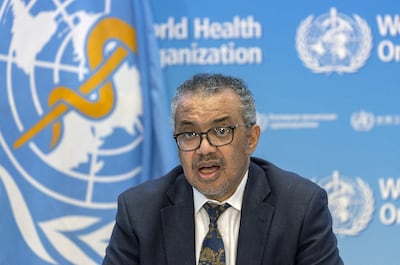The WHO last week declared an end to the Covid-19 public health emergency, bringing a four-year “serious and sudden” global alert to a close.
How many of us now have the Covid era in the rear-view mirror? Despite the WHO warning that this should not be how its announcement is read, that is likely to be the case for most of us.
It is remarkable how intensely so many experienced the threat from the novel coronavirus that emerged in 2019. Living patterns and ability to work were comprehensively, but not uniformly, disrupted for most of the first two years of the spread of the disease.
It is remarkable to now think that the waters closed over so smoothly for societies that appeared to be stalked by the lockdowns and, sadly, mass deaths. The overhanging issues are for many not really the health issues – though Long Covid affects a very significant number of people – but the public debt explosion in western economies and raging, nasty inflation almost everywhere.

When WHO Director General Dr Tedros Adhanom Ghebreyesus confirmed that Covid-19 will no longer be categorised a Public Health Emergency of International Concern, that did not mean that a substantive agenda related to the disease and its cross-border threats does not remain.
What it does mean is that the 196 countries around the world that are signed up to the International Health Regulations are no longer obliged to accept temporary recommendations from the WHO and guidance from the director general on what should be done to handle the crisis.
According to the Gavi consortium on vaccines, the roll-out has vastly mitigated the odds of severe illness and death. There are issues around vaccine uptake, which still isn’t high enough in many places. Gavi said in January that the virus was still killing a large number of people every week, and straining several taxed and tired health systems. At the time, it said that across 92 lower-income countries, 53 per cent of people had received a full primary series of vaccine, which it noted was a disappointing contrast to Europe’s 67 per cent vaccination rate. Meanwhile, Africa, at 34 per cent, was only half as well protected as the Europeans.
It also noted that the Omicron strain of Covid-19 has been milder in impact than some of the previous variants.
None of this, however, takes into account how to handle a new, more threatening and voracious disease.
The UN will meet this week, and again in September, to reinvigorate what was a global consensus that pandemic readiness must be rebuilt. A series of recommendations have been put forward by former international leaders Ellen Johnson Sirleaf and Helen Clark. These deserve to be listened to and acted on.
Their Road Map for a World Protected from Pandemic Threats said a comprehensive response is still needed. Patchy and limited implementation of recommendations from previous reports reviewing major outbreaks, including Ebola in West Africa in 2014-2016, left gaps and contributed directly to the Covid-19 outbreak becoming a pandemic, according to the document that looks forward to the UN’s General Assembly meeting later in the year.
“Covid-19 caused complex and devastating shocks to every country, and has long-term impacts for economic and social recovery. Let us never repeat it,” Ms Johnson Sirleaf said. “We will face new pandemic threats. The UNGA must draw on the hard lessons from Covid-19 and honour the memory of the many millions of people who have died, to commit to comprehensive reforms that leave no gaps in the system this time.”
The roadmap calls on the high-level meeting to set out action in six areas, making a political declaration that amounts to a comprehensive package. Its authors say a financing plan is essential with an estimated need for more than $10 billion annually for low- and middle-income countries. They note that so far about 10 per cent of that has been committed to the UN-led Pandemic Fund.
The centrepiece of the call for pandemic countermeasures is a shared public health model that is universal but also ensures “regional resilience” and has mechanisms for technology sharing. It demands the start of negotiations on a pandemic accord, which amends International Health Regulations, to be the platform for rules setting.
A beefed-up WHO could make this operational by working to support national efforts to minimise the risks of health emergencies and consequences. A sixth facet is that this set-up would need to incorporate a robust independent monitoring element.
The way forward is clear and negotiations are not to be feared. Countries will bring their own ideas and demands to the table to shape this effort under the UN. They have a good starting point with this report. What is essential is that they get the talks over the line as quickly as possible.


